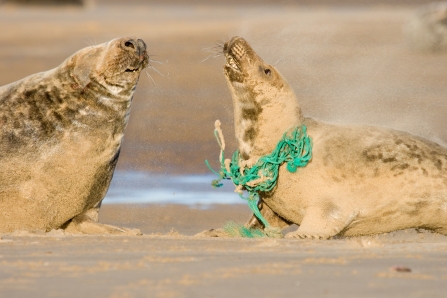
It's time for a sea change in the way in which we think about and act on the environment. Photo, Tom Marshall
This week Chris Packham has published A People’s Manifesto for Wildlife. Bold, blunt and straight to the point, it is as uncompromising in its exposure of the scale of wildlife’s decline and its causes as it is daring and far sighted in its proposed solutions. Peppered with pithy statements such as “The cult of tidiness must end”, as well as engaging concepts like a new “Ministry of Trees”, it is that rare thing in the world of manifestos - hard to put down.
The subtitle – 200 ideas to make a difference in UK Conservation – is also telling. At a time when everything in politics seems so chaotic and uncertain, we can be free thinking, challenge long held beliefs, explode old myths. Out of the mess can come some wonderfully fresh new ideas to shine a light on the decades ahead.
'To talk of conserving nature is simply not enough – we have to talk about bringing it back'
We know that wildlife has been in decline for a long time. I regularly show a graph that illustrates the rapid decline in farmland birds since 1970. But the truth is that there were far fewer farmland birds in 1970s than there were fifty years earlier. And there are well documented statements from Victorian naturalists lamenting how much marine life had been lost in recent years and how the wildlife enthusiasts of that time could no longer enjoy many of the wonders that previous generations had done. To talk of conserving nature is simply not enough – we have to talk about bringing it back.
This is easy to say of course. Making it happen is another matter. It is tempting to point the finger at the usual suspects of intensive farming and fishing, built development and emissions from cars and industry. And all of these have a part to play in the problem of course. But in truth all of us are implicated to some degree, as millions of us are consumers of the very products whose manufacture causes the problem in the first place.
Whoever might be to blame, the good news is that many of these problems are solvable, at least in the UK. We do know how to build houses and design urban areas so that they are wildlife friendly. We do know how to farm and produce food in a way that does not cost the Earth. We can avoid polluting or rivers and stream and manage our seas sustainably to protect our fish stocks. We have the choice to purchase widely and ethically. And whatever some may claim, there is seldom if ever any convincing economic or other justification for damaging or destroying our wildlife sites.
The Manifesto comes at a critical time. The government is expected to publish draft plans for new environmental legislation this autumn. All of us who care about the future need to be pushing for this to be ambitious and far sighted. Merely replacing the protections in EU law with a UK version is nowhere near good enough, because birds, bees and rare habitats have continued to disappear despite them.
'The people of the UK need to speak up for wildlife and this is where The Wildlife Trusts can play a key role'
This is a time when the people of the UK need to speak up for wildlife. And this is where The Wildlife Trusts can play a key role. Between us we have Hundreds of active local groups, thousands of places where we can show nature at its best. Hundreds of thousands of members, supporters and volunteers. We also run a huge variety of project showing how wildlife can be integrated successfully into farming, building and healthy living.
At the Devon Wildlife Trust we will be doing all we can to help push forward many of the ideas and proposals in the Manifesto. In fact, we will be working on a Devon manifesto of our own. We may us different language and emphasis, and we will almost certainly take a different approach in how we address certain groups. Building bridges and consensus wherever we can is critical. But we will be working towards the same end – the recovery of nature, on land, at sea, in the air, starting now, supported by local communities everywhere. If that’s not a goal worth striving for, I don’t know what is!
On Saturday 22 September The Wildlife Trusts will be supporting The Peoples' Walk for Wildlife. Will you join us there?
As part of our local campaign for change join us for an evening with Tony Juniper - writer, sustainability adviser and well-known British environmentalist. Tony's talk 'Can the UK be a world leader? How a new Environment Act could help save the planet' takes place at University of Plymouth at 6.45pm Friday 5 October. Booking essential.
Organised by the University of Plymouth Sustainable Earth Institute (SEI) and Devon Wildlife Trust.

